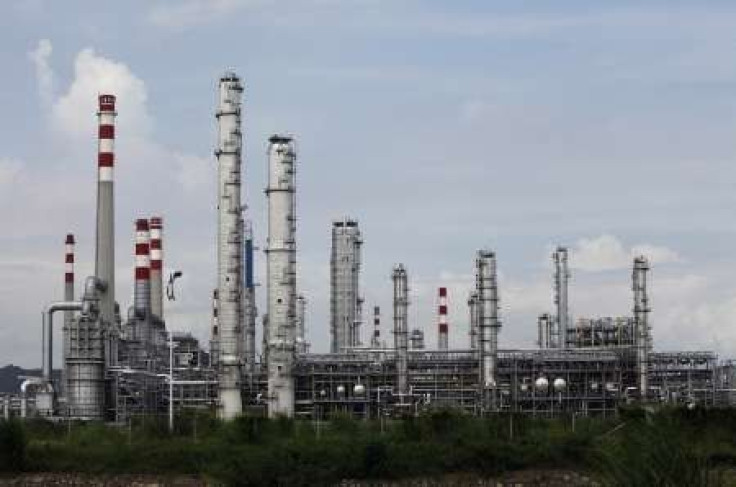Analysis: China oil demand growth to halve

China's oil demand growth in 2011 may slow to half of last year, as Beijing's moves to rein in excessive credit are expected to slow economic growth and energy use.
The world's No. 2 oil user may consume 5-7 percent more crude, or an incremental 450,000 to 550,000 barrels per day (bpd) this year. That follows a blistering 19 percent rise in December fueled by a diesel crunch, and a 12 percent increase for the whole of 2010.
Despite the slowdown, China would account for 40 percent of global demand growth of 1.4 million bpd forecast by the International Energy Agency (IEA), or 30 percent of the 1.5-1.8 million bpd predicted last month by Saudi oil minister Al ali-Naimi, supporting prices after Brent pierced past $100 for the first time since 2008 this week.
The strong momentum will spill into 2011 as China pushes harder to develop its economy with a focus on lifting incomes, especially in the central and western parts of the country, said Zhu Fang, deputy director of market analysis with the semi-official China Petroleum and Chemical Industry Federation.
The nation's record incremental fuel use at close to one million bpd and an all-time high increase in crude imports of 710,000 bpd was a key factor for prices rising 15 percent last year.
The 5 to 7 percent demand expansion this year would test China's refining sector, which despite a production boom in the last two years is adding less new capacity and a smaller crude throughput, according to a Reuters poll found.
That implies the need to step up net imports of fuels such as naphtha and diesel, supporting already rebounding global distillates markets.
If Chinese refineries maintain normal operation ratios and normal yields of gasoline and diesel, China will likely see a diesel supply gap of 3.5 million tonnes (70,000 bpd) this year, said Dai Jiaquan, an oil market researcher with CNPC.
MODEST RISE IN RUNS, FUEL EXPORTS
A Reuters survey found China's top 24 oil plants, which account for more than half of the country's total refining capacity, would process only 170,000 bpd, or 4 percent, more crude this year than last. That's mainly because nearly half a dozen top plants have planned heavy turnarounds.
While industry officials brushed off a repeat of the diesel squeeze that hit many factories in the final months of last year as mandatory power restrictions ended, a lagging supply cushion may force oil firms to reduce diesel exports that had expanded for most of last year.
We are not going to raise imports drastically this year but will cut exports sharply, said an official with top refiner Sinopec Corp (0386.HK), referring to diesel. Sinopec was the dominant diesel exporter last year.
Sinopec is re-emerging as a diesel exporter after a pause in January as a months-long diesel shortage ended, but the amount the refiner expected to ship abroad would be sharply below a year-earlier monthly average of nearly 80,000 bpd.
Predicting Chinese oil demand has never been easy.
For both 2009 and 2010, analysts had underestimated Chinese oil growth as the economy hummed along despite cooling measures. Demand growth last year exceeded the previous peak in 2004 when China used an additional 800,000-900,000 bpd of oil amid the worst power shortage in decades.
This time, analysts appear convinced that the world's No. 2 economy is heading toward more sustainable growth, led by consumption rather than government pump priming, and a moderating expansion in China's foreign trade also pointed to downward pressure on energy use.
The stimulus plan is mostly over and China is in the midst of taming growth. This year's (oil) growth will be a bit sluggish due to a very strong base of 2010, said Wu Kang, Hawaii-based senior advisor at FACTS Global Energy.
STOCKPILING
Apart from broader economic factors, China's oil demand has been increasingly susceptible to global crude prices and the country's longer-term need to build up petroleum stockpiles as its import dependence steadily climbs to more than half.
If crude hovers above $90 or marches up further, it would prompt independent Chinese fuel dealers to build stocks anticipating government fuel hikes and thus inflate demand.
Under China's two-year-old domestic fuel scheme that tracks global crude prices plus an undisclosed refining margin, Beijing more often than not delays fuel price hikes, or raises by a smaller margin than the gains in crude warrant, wary of popular resentment.
If we take into account this stockpiling factor, Chinese oil demand growth will once again err on the upside, said Yan Kefeng of Cambridge Energy Research Associates.
China's stockpiling drive of both crude oil and refined fuel, officially kicked off as its first strategic crude reserve base started in 2006, would continue to play a role in China's oil demand this year, having contributed between 100,000 and 160,000 bpd in last year's apparent consumption, analysts estimated.
NEW DIESEL SPEC
While diesel demand - making up some 37 percent of Chinese fuel use - closely tracks economic indicators such as factory output and China's export growth, China's gasoline growth will be tamed this year as the government removes incentives for small car purchases, which made up nearly 70 percent of China's total car sales last year, analysts said.
A government promotion of methanol, a chemical that can be blended into petrol, will also curb gasoline demand.
Worth watching is China's push for cleaner diesel, as end-June this year is the cut-off date for the country to start using EURO III specification automotive diesel nationwide.
It all depends on how forceful the government's implementation will be. If the government is serious, we may end up importing some of the cleaner diesel and export the lower-grade ones, said the Sinopec official.
© Copyright Thomson Reuters 2024. All rights reserved.











